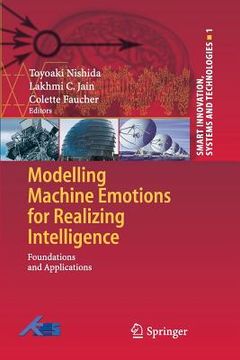Share
modelling machine emotions for realizing intelligence: foundations and applications (in English)
Toyoaki Nishida
(Illustrated by)
·
Colette Faucher
(Illustrated by)
·
Springer
· Paperback
modelling machine emotions for realizing intelligence: foundations and applications (in English) - Nishida, Toyoaki ; Faucher, Colette
$ 161.04
$ 169.99
You save: $ 8.95
Choose the list to add your product or create one New List
✓ Product added successfully to the Wishlist.
Go to My WishlistsIt will be shipped from our warehouse between
Friday, June 21 and
Monday, June 24.
You will receive it anywhere in United States between 1 and 3 business days after shipment.
Synopsis "modelling machine emotions for realizing intelligence: foundations and applications (in English)"
Emotion connects the thought to the body, which is a magnificent biological - vice for sensing and affecting the world. The thought controls the body through emotions. The body affects the thought through emotions. Through this mec- nism, the thought allows the agent to behave intelligently in the complex world filled with a huge amount of dynamic information. The emotion maps a flux of information into a space which the agent is familiar with, enabling her/him to associate ongoing events with past experiences which help to reduce complexity by providing with a nominal solution. Recent findings in brain science suggest that mirror neurons map visual signals into motor signals for the body. This mechanism might permit one to experience the emotion of the other agent just by feeling the motor signals caused by mirror neurons as a result of visual stimuli caused by the other agent's emotional beh- iors. In particular, it might play a significant role in invoking empathy in a social situation. It may not be hard to think about what might happen to emotion-less machines. The emotion-less machines may not be able to accumulate experiences to avoid serious failures. They may not be able to communicate with the humans in an empathetic way.
- 0% (0)
- 0% (0)
- 0% (0)
- 0% (0)
- 0% (0)
All books in our catalog are Original.
The book is written in English.
The binding of this edition is Paperback.
✓ Producto agregado correctamente al carro, Ir a Pagar.

